新概念英语二Lesson 14 Do you speak English?课件 (共27张PPT)
文档属性
| 名称 | 新概念英语二Lesson 14 Do you speak English?课件 (共27张PPT) | 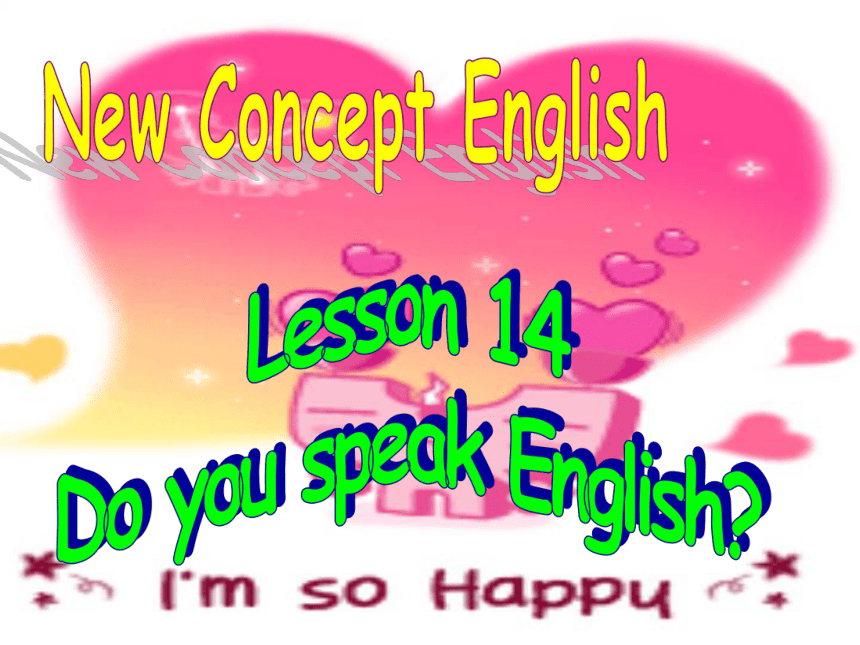 | |
| 格式 | ppt | ||
| 文件大小 | 1.5MB | ||
| 资源类型 | 教案 | ||
| 版本资源 | 新概念英语 | ||
| 科目 | 英语 | ||
| 更新时间 | 2023-10-06 10:01:35 | ||
图片预览

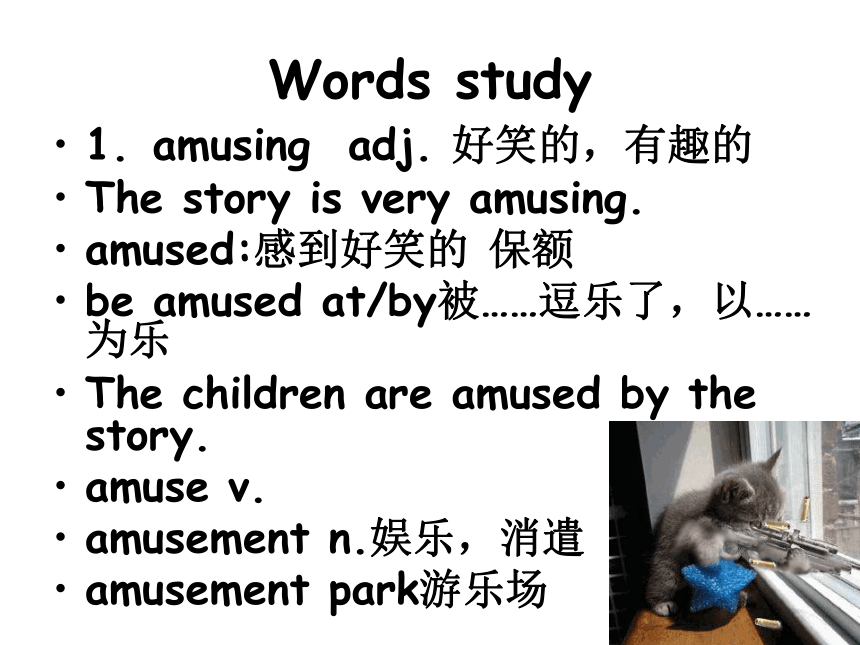
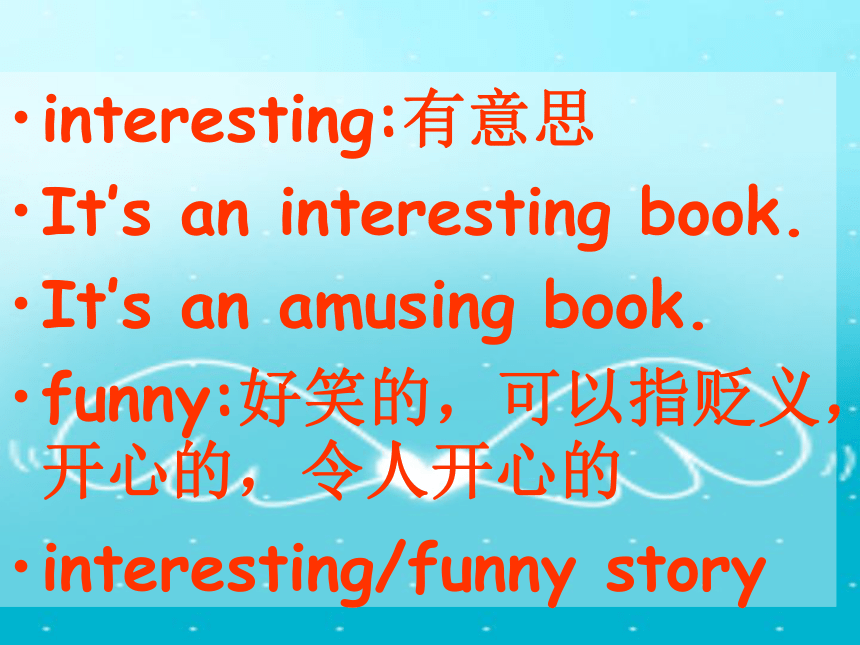
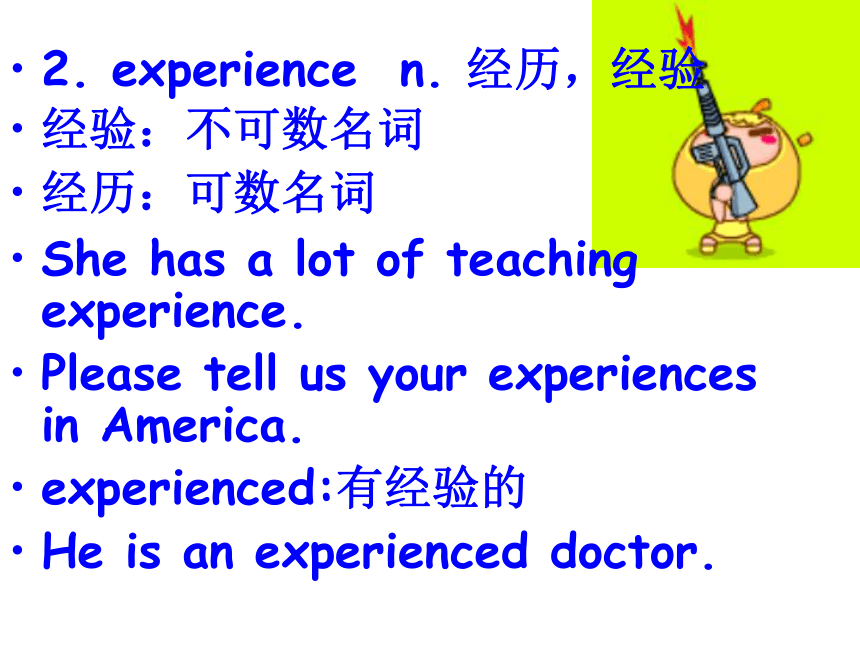
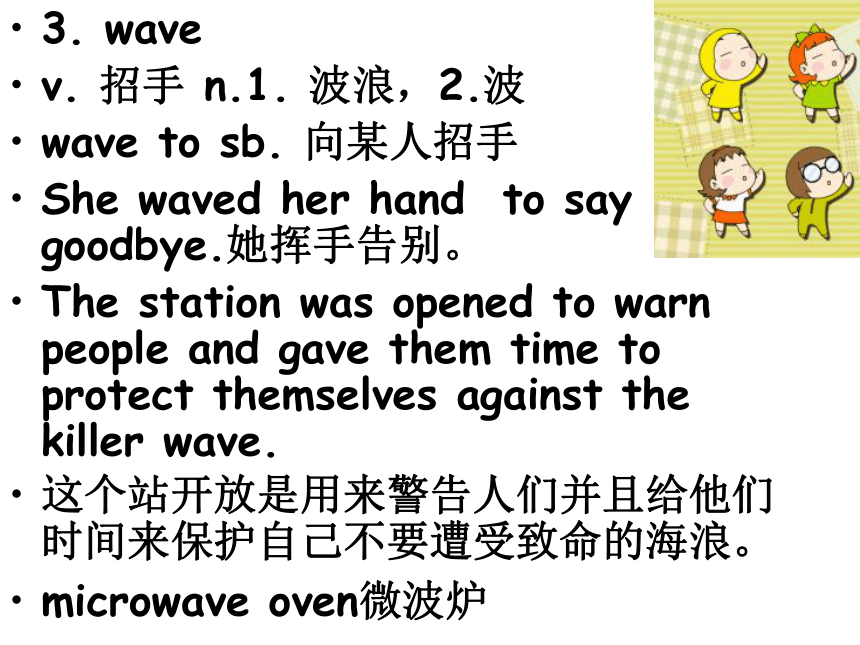
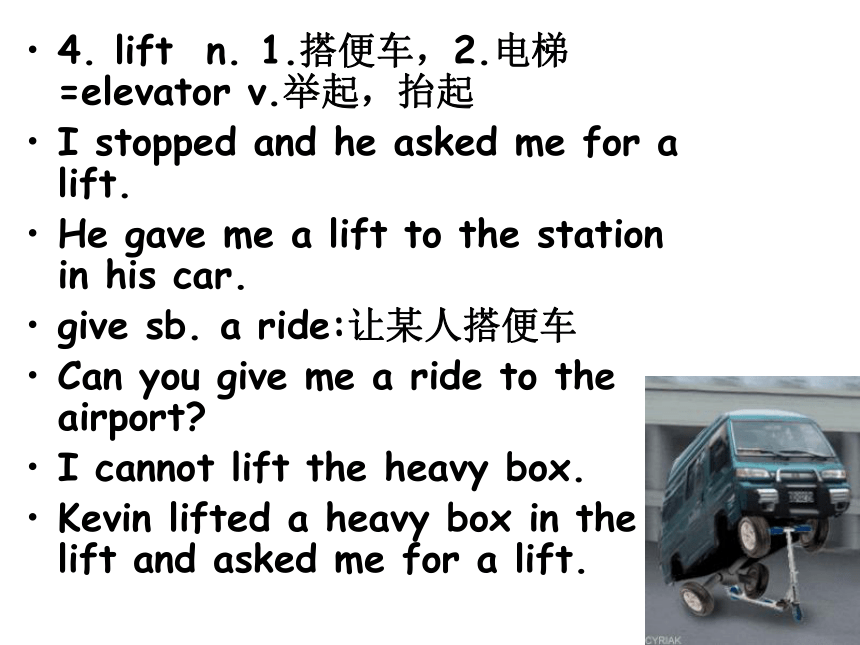

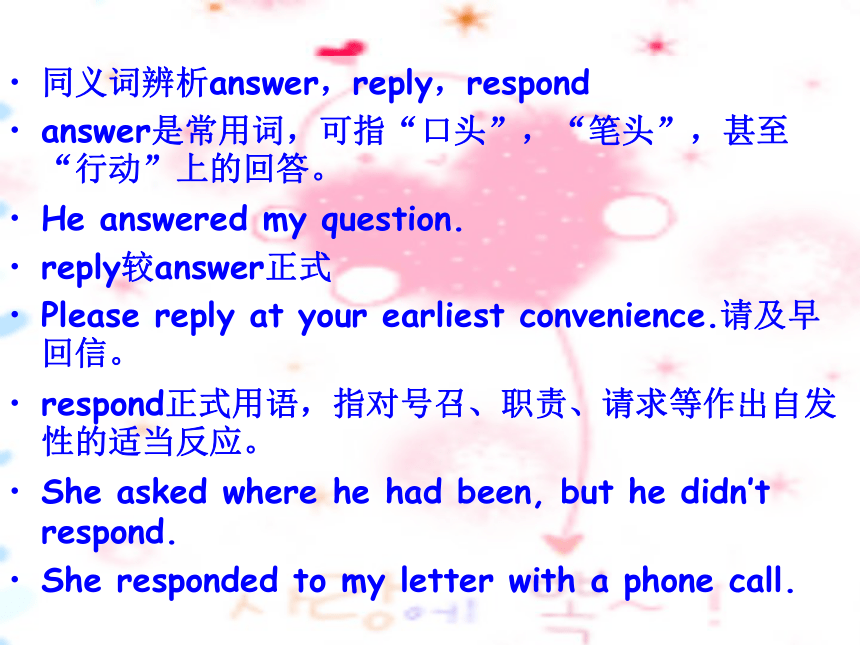
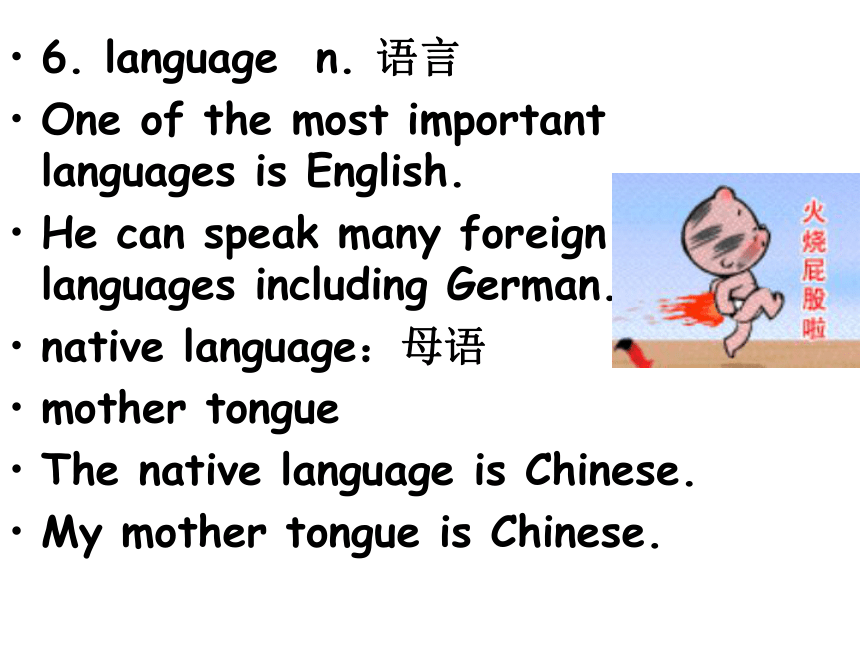
文档简介
(共27张PPT)
Words study
1. amusing adj. 好笑的,有趣的
The story is very amusing.
amused:感到好笑的 保额
be amused at/by被……逗乐了,以……为乐
The children are amused by the story.
amuse v.
amusement n.娱乐,消遣
amusement park游乐场
interesting:有意思
It’s an interesting book.
It’s an amusing book.
funny:好笑的,可以指贬义,开心的,令人开心的
interesting/funny story
2. experience n. 经历,经验
经验:不可数名词
经历:可数名词
She has a lot of teaching experience.
Please tell us your experiences in America.
experienced:有经验的
He is an experienced doctor.
3. wave
v. 招手 n.1. 波浪,2.波
wave to sb. 向某人招手
She waved her hand to say goodbye.她挥手告别。
The station was opened to warn people and gave them time to protect themselves against the killer wave.
这个站开放是用来警告人们并且给他们时间来保护自己不要遭受致命的海浪。
microwave oven微波炉
4. lift n. 1.搭便车,2.电梯 =elevator v.举起,抬起
I stopped and he asked me for a lift.
He gave me a lift to the station in his car.
give sb. a ride:让某人搭便车
Can you give me a ride to the airport
I cannot lift the heavy box.
Kevin lifted a heavy box in the lift and asked me for a lift.
5. reply v. 回答
I replied that I wasn’t able to help them.
reply to 回答;
in reply (to)为答复……,作为对……的答复
make (no )reply(不)作答
I wrote to him but he made no reply.
同义词辨析answer,reply,respond
answer是常用词,可指“口头”,“笔头”,甚至“行动”上的回答。
He answered my question.
reply较answer正式
Please reply at your earliest convenience.请及早回信。
respond正式用语,指对号召、职责、请求等作出自发性的适当反应。
She asked where he had been, but he didn’t respond.
She responded to my letter with a phone call.
6. language n. 语言
One of the most important languages is English.
He can speak many foreign languages including German.
native language:母语
mother tongue
The native language is Chinese.
My mother tongue is Chinese.
7. journey n. 旅行
Have a pleasant journey.
同义词辨析:trip,travel,tour,journey,voyage,flight
travel:总称,通常指国外的旅行
tour, 观光旅游
journey:偏重于长途的陆地旅行
trip:短距离旅行或出差
He went for a trip on business.
voyage:旅行(海上)
flight:空中飞行
Text study
1. in the south of…在……的南方,南部
表达方位的表达方式一共有3个介词,in,on,to
用in表示在同一版图之内
Bejing is in the north of China.
Dalian is in the south of Liaoning.
没有相接的,是相离的,to
Japan is to the east of China.
Changchun is to the north of Shengyang.
用on表示接壤
Fushun is on the east of Shenyang.
Russia is on the north of China.
2. drive to:开车去某地,
drive on (on:继续),on加在动词的后面表示继续
3. on the way:在路上,在途中
On my way to work, I was caught in a traffic jam.
4. I stopped and he asked me for a lift.
I sat there and listened to the music.
5. as soon as:一......就......
I’ll have dinner as soon as my mother comes back.
I’ll go to the park as soon as the rain stops.
6. say good morning /say goodbye/say sorry/say hello/say thank you to sb.
speak+某种语言
I can speak English
speak to sb.同……讲话
The boss hasn’t spoken to three important person who are waiting to see him.
in+某种语言 用英语
I say a word in Chinese.
tell讲述,告诉
tell a story , tell a lie, tell the truth, tell the time, tell a secret, tell the difference
talk 谈话
talk to/talk with
Michael’s boss talked with him today.
7. not at all:一点也不
I don’t like onions at all.
(口语)不客气
8. nearly = almost 几乎
It’s nearly/almost 7 0’clock.
9. few/a few
My sister has a few friends, but she has few good friends.
10.as
1).正如 2).像 3).当……时候 4).作为
As we know, smoking is bad for health.
You should do it as what I said.
As Jenny was reading a newspaper, the old granny fell asleep.
Ray works as an English teacher in PEC.
Grammar Study
【Key structures】
过去完成时
过去完成时:过去的过去或两个动作都在过去,一个动作在前,一个在后,
发生在前的动作为过去完成时
过去完成时一定要以一个过去时态在铺垫,这个动作一定要发生在had done之后
When I got there, the boy had left.
Grammar Study
用法:
1. already, just, ever, yet
He told me their team had already won.
I heard that the president had just arrived.
2. told said knew, heard, believed等动词后的宾语从句
She told me she hadn’t had supper.
She said she had been to Paris.
He believed he had done the right thing.
3. when,before,after,as soon as,til/until,by引导的时间状语
When the police arrived, the thieves had gone away.
I found the letter after he had gone away.
What had you seen before I called you
after后面会家过去完成时,before后面会加一般过去时
By the end of 2005 he had already graduated from middle school.
I didn’t begin work until he had gone.
直到……才……
e.g. I didn’t go to bed until 11 o’clock.
Kevin doesn’t do his homework until his mother comes back.
一般过去时/过去完成时
两个动作如顺序发生,又不强调先后,或用and, but, then等连词时,多用一般过去时
e.g. When she saw the mouse, she scream.
My aunt gave me a hat and I lost it.
两个动作相继发生,可都用一般过去时;若强调两个动作发生的时间前后,先发生的动作用过去完成时
e.g. When I heard the news, I was very excited.
When she got home, her children had slept.
【Special difficulties】
1. ask and ask for
ask sth.问什么什么东西,ask a question/ask sb.
After the class , he asked me a question.
ask sb. to do sth.
My mother always asks me to wash the dishes after dinner.
ask for sth.要求得到
He asked for an apple
Bill always asks his mother for money
I asked a question, but I didn’t ask for an answer.
2.except,except for, apart from除了什么之外
I invited everyone except George.
1).when except is used at the beginning of a sentence, it is followed by for.
2). except for=apart from习惯上喜欢放句首
Except for/apart from this, everything is in order.
Except for a slight headache, I feel all right now.
Apart from being a bit too long, the play was very good.
except/besides除了什么之外
besides在整体之中除了……之外还有……,是加号
Besides John,there will be five of us for dinner.
except在整体之中除了……以外不包括……是减号
The article is very good except a few spelling mistakes.
3.which of ,either of, neither of ,both of
either of :两者当中的任何一个
neither of:两者都不
Either of them will do.
Either of the films is good.
Neither of the films is good.
I wrote to either of them.
I wrote to neither of them.
which of :那一个,
which of the two do you want
both of:两者都
I like them very much, I bought both of them.
注意:
There are many trees on both sides of the street.
There are many trees on each side of the street.
Shall I sit at this end of the boat or the other end
If you keep still, you can sit at either.
Words study
1. amusing adj. 好笑的,有趣的
The story is very amusing.
amused:感到好笑的 保额
be amused at/by被……逗乐了,以……为乐
The children are amused by the story.
amuse v.
amusement n.娱乐,消遣
amusement park游乐场
interesting:有意思
It’s an interesting book.
It’s an amusing book.
funny:好笑的,可以指贬义,开心的,令人开心的
interesting/funny story
2. experience n. 经历,经验
经验:不可数名词
经历:可数名词
She has a lot of teaching experience.
Please tell us your experiences in America.
experienced:有经验的
He is an experienced doctor.
3. wave
v. 招手 n.1. 波浪,2.波
wave to sb. 向某人招手
She waved her hand to say goodbye.她挥手告别。
The station was opened to warn people and gave them time to protect themselves against the killer wave.
这个站开放是用来警告人们并且给他们时间来保护自己不要遭受致命的海浪。
microwave oven微波炉
4. lift n. 1.搭便车,2.电梯 =elevator v.举起,抬起
I stopped and he asked me for a lift.
He gave me a lift to the station in his car.
give sb. a ride:让某人搭便车
Can you give me a ride to the airport
I cannot lift the heavy box.
Kevin lifted a heavy box in the lift and asked me for a lift.
5. reply v. 回答
I replied that I wasn’t able to help them.
reply to 回答;
in reply (to)为答复……,作为对……的答复
make (no )reply(不)作答
I wrote to him but he made no reply.
同义词辨析answer,reply,respond
answer是常用词,可指“口头”,“笔头”,甚至“行动”上的回答。
He answered my question.
reply较answer正式
Please reply at your earliest convenience.请及早回信。
respond正式用语,指对号召、职责、请求等作出自发性的适当反应。
She asked where he had been, but he didn’t respond.
She responded to my letter with a phone call.
6. language n. 语言
One of the most important languages is English.
He can speak many foreign languages including German.
native language:母语
mother tongue
The native language is Chinese.
My mother tongue is Chinese.
7. journey n. 旅行
Have a pleasant journey.
同义词辨析:trip,travel,tour,journey,voyage,flight
travel:总称,通常指国外的旅行
tour, 观光旅游
journey:偏重于长途的陆地旅行
trip:短距离旅行或出差
He went for a trip on business.
voyage:旅行(海上)
flight:空中飞行
Text study
1. in the south of…在……的南方,南部
表达方位的表达方式一共有3个介词,in,on,to
用in表示在同一版图之内
Bejing is in the north of China.
Dalian is in the south of Liaoning.
没有相接的,是相离的,to
Japan is to the east of China.
Changchun is to the north of Shengyang.
用on表示接壤
Fushun is on the east of Shenyang.
Russia is on the north of China.
2. drive to:开车去某地,
drive on (on:继续),on加在动词的后面表示继续
3. on the way:在路上,在途中
On my way to work, I was caught in a traffic jam.
4. I stopped and he asked me for a lift.
I sat there and listened to the music.
5. as soon as:一......就......
I’ll have dinner as soon as my mother comes back.
I’ll go to the park as soon as the rain stops.
6. say good morning /say goodbye/say sorry/say hello/say thank you to sb.
speak+某种语言
I can speak English
speak to sb.同……讲话
The boss hasn’t spoken to three important person who are waiting to see him.
in+某种语言 用英语
I say a word in Chinese.
tell讲述,告诉
tell a story , tell a lie, tell the truth, tell the time, tell a secret, tell the difference
talk 谈话
talk to/talk with
Michael’s boss talked with him today.
7. not at all:一点也不
I don’t like onions at all.
(口语)不客气
8. nearly = almost 几乎
It’s nearly/almost 7 0’clock.
9. few/a few
My sister has a few friends, but she has few good friends.
10.as
1).正如 2).像 3).当……时候 4).作为
As we know, smoking is bad for health.
You should do it as what I said.
As Jenny was reading a newspaper, the old granny fell asleep.
Ray works as an English teacher in PEC.
Grammar Study
【Key structures】
过去完成时
过去完成时:过去的过去或两个动作都在过去,一个动作在前,一个在后,
发生在前的动作为过去完成时
过去完成时一定要以一个过去时态在铺垫,这个动作一定要发生在had done之后
When I got there, the boy had left.
Grammar Study
用法:
1. already, just, ever, yet
He told me their team had already won.
I heard that the president had just arrived.
2. told said knew, heard, believed等动词后的宾语从句
She told me she hadn’t had supper.
She said she had been to Paris.
He believed he had done the right thing.
3. when,before,after,as soon as,til/until,by引导的时间状语
When the police arrived, the thieves had gone away.
I found the letter after he had gone away.
What had you seen before I called you
after后面会家过去完成时,before后面会加一般过去时
By the end of 2005 he had already graduated from middle school.
I didn’t begin work until he had gone.
直到……才……
e.g. I didn’t go to bed until 11 o’clock.
Kevin doesn’t do his homework until his mother comes back.
一般过去时/过去完成时
两个动作如顺序发生,又不强调先后,或用and, but, then等连词时,多用一般过去时
e.g. When she saw the mouse, she scream.
My aunt gave me a hat and I lost it.
两个动作相继发生,可都用一般过去时;若强调两个动作发生的时间前后,先发生的动作用过去完成时
e.g. When I heard the news, I was very excited.
When she got home, her children had slept.
【Special difficulties】
1. ask and ask for
ask sth.问什么什么东西,ask a question/ask sb.
After the class , he asked me a question.
ask sb. to do sth.
My mother always asks me to wash the dishes after dinner.
ask for sth.要求得到
He asked for an apple
Bill always asks his mother for money
I asked a question, but I didn’t ask for an answer.
2.except,except for, apart from除了什么之外
I invited everyone except George.
1).when except is used at the beginning of a sentence, it is followed by for.
2). except for=apart from习惯上喜欢放句首
Except for/apart from this, everything is in order.
Except for a slight headache, I feel all right now.
Apart from being a bit too long, the play was very good.
except/besides除了什么之外
besides在整体之中除了……之外还有……,是加号
Besides John,there will be five of us for dinner.
except在整体之中除了……以外不包括……是减号
The article is very good except a few spelling mistakes.
3.which of ,either of, neither of ,both of
either of :两者当中的任何一个
neither of:两者都不
Either of them will do.
Either of the films is good.
Neither of the films is good.
I wrote to either of them.
I wrote to neither of them.
which of :那一个,
which of the two do you want
both of:两者都
I like them very much, I bought both of them.
注意:
There are many trees on both sides of the street.
There are many trees on each side of the street.
Shall I sit at this end of the boat or the other end
If you keep still, you can sit at either.
同课章节目录
